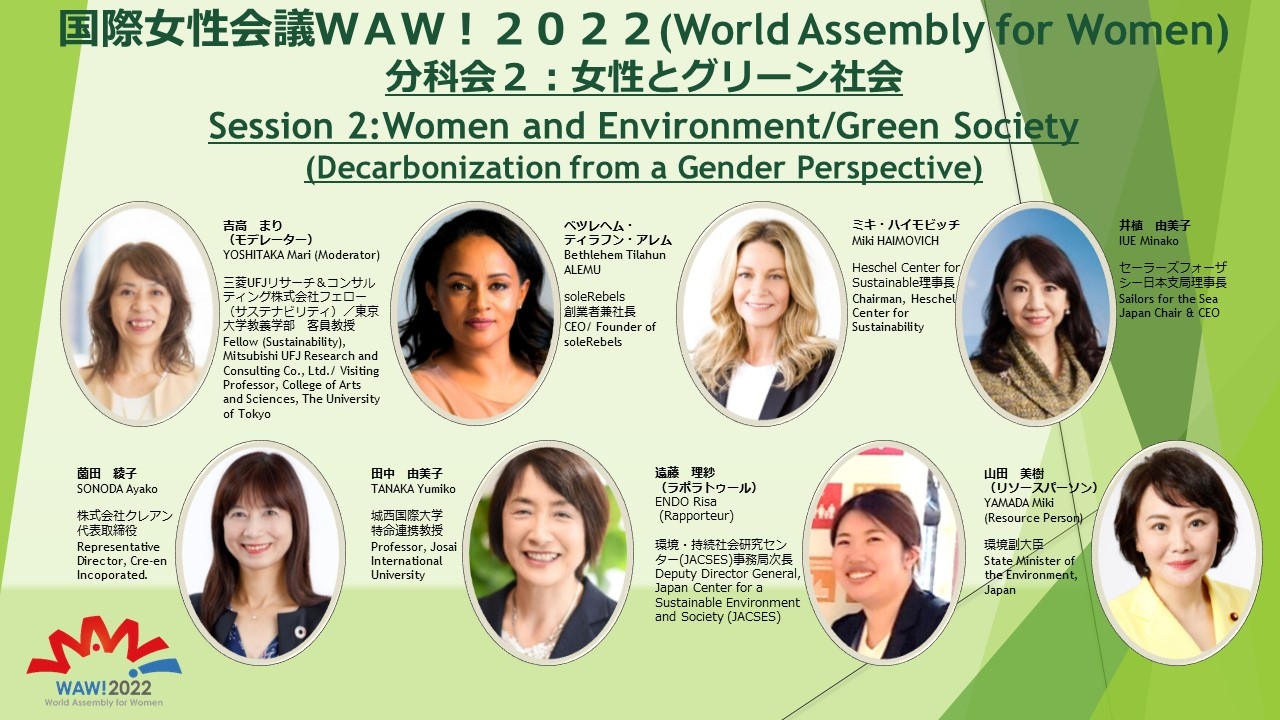Women's Empowerment and Gender Equality
World Assembly for Women: WAW! 2022
Concept Note
Women and Environment/Green Society
– Decarbonization from a Gender Perspective
Participants (Regularly Updated)

- YOSHITAKA Mari, Fellow (Sustainability), Mitsubishi UFJ Research and Consulting Co., Ltd./ Visiting Professor, College of Arts and Sciences, The University of Tokyo (Moderator)
- Bethlehem Tilahun ALEMU, CEO/ Founder of soleRebels
- Miki HAIMOVICH, Chairman, Heschel Center for Sustainability
- IUE Minako, Chair/CEO, Sailors for the Sea Japan
- SONODA Ayako, Representative Director, Cre-en Incorporated.
- TANAKA Yumiko, Professor, Josai International University
- ENDO Risa, Deputy Director General, Japan Center for a Sustainable Environment and Society (JACSES) (Rapporteur)
- YAMADA Miki, State Minister of the Environment, Japan (Resource Person)
Current situation and challenges to be discussed
Climate change affects everyone, but the degree of impact varies by gender, age, social class and other various factors. For example, when women in the least developed countries are responsible for securing water for their daily lives, they may have to go farther to fetch water due to environmental changes caused by floods, droughts, cyclones, etc. Climate change-related disasters may also increase the burden of housework and care work on women and put them at greater risk than men of losing their means of livelihood(note1).
On the other hand, some analysts have reported that the higher the participation rate of women in climate change actions, the better the performance of climate change initiatives, and that women's active participation is the key to promoting a zero-emission society(note2). In order to further promote such activities, it is necessary to promote education and human resource development for women in STEM fields from a young age.
In recent years, the relationship between business and human rights has been reconsidered in many countries, and as stated in the 1995 Beijing Declaration and Platform for Action, women's rights are human rights, and companies are requested to disclose their human rights status, including the status of women's rights. While it is now a matter of course for corporate activities to take human rights into consideration, by working on both decarbonization and women's activities and disclosing information, companies can receive the recognition they deserve, raise more funds, improve corporate value and achieve sustainable corporate growth, and be able to work on decarbonization from diverse perspectives. In addition, incorporating gender perspectives will help to address a variety of issues. Discussions on gender equality and women's empowerment in the climate change and environmental fields must be further developed and lead to concrete actions in the future.
The WAW! 2022 aims to become a turning point for women's participation from the planning stage of decarbonization measures, sharing practical examples from Japan and other countries and discussing concrete actions for the future.
Discussion topics
- Why is the participation of women necessary in the energy, transportation/manufacturing, and home/office industries, which are expected to expand in the future in order to realize a decarbonized society? What actions can be taken to promote women's participation? What are some good examples of decarbonization efforts in the private sector with a gender perspective?
- What are the barriers to women's participation in national and local decarbonization and climate change planning, implementation, monitoring, and evaluation? What are some of the leading good national and international examples?
- What kind of education and human resource development is needed to promote women's participation toward a decarbonized society?
- (note1) UNDP “Gender and Climate Change: Impact and Adaptation”

- (note2) 資源エネルギー庁、“脱炭素化社会に向けて世界が集結!東京ビヨンド・ゼロ・ウイーク開催(前編)”
 (Japanese)
(Japanese)

